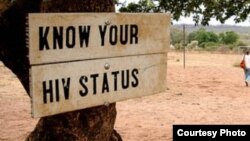Researchers say homophobia and criminalization of homosexuality seem to be playing a major role in the alarming increase of HIV infections in Africa.
The discrimination against homosexuality threatens Africa’s health as statistic show an alarming increase in the rate of infections among same-sex relations.
Researchers from Oxford University, the Population Council of Ghana and the Kenya Medical Research Institute recently reviewed AIDS studies conducted over the past few years and concluded that male-male sex was a major blind spot in AIDS research and policy in Africa.
GALZ’s (Gays and Lesbians of Zimbabwe) programme manager, Samuel Matsikure, says many homosexual men are reluctant to approach health providers for fear of stigma and discrimination.
Matsikure says, “In as much as GALZ exists to help and empower the Lesbian, Gay, Bisexual, Transgender, Intersex, and Questioning (LGBTIQ) community, not all gay men are approaching us as an association or health providers when they are faced with health challenges. This is due to so much hate our members are experiencing in the hands of health providers and the society at large. Some people feel that it is safer to keep their health issues to themselves.
“Our government has to start appreciating that the LGBTIQ community does not exist in isolation, it is part of the society, meaning that any issues that affect this fraction of the society has a bearing on the overall wellbeing of the entire country.”
The same dilemma of stigmatization goes for the LGBTIQ community in Lesotho. The People’s Matrix director, Tampose Mothopeng, says as a group promoting the rights of the LGBTIQ, they have engaged in many partnerships with other institutions addressing issues of good health practices, and the group has also gone on to train some health providers on how to approach LGBTIQ health issues and dealing with members of that community.
Mothopeng, however, says the environment is still not very friendly to the LGBTI community, instilling fear in members to approach health providers and to come out when faced with health problems.
“Health education is at the core of our agenda, as we have realized that until the environment is conduce, we will need to empower and educate our community,” says Mothopeng.
Many of Africa's gay communities operate largely underground. Zimbabwean President Robert Mugabe set the tone of the public discourse on homosexuality throughout much of the continent back in 1995, when he remarked at the Harare Book Fair that he found it "repugnant" that "... homosexuals, who offend both against the law of nature and the morals of religious beliefs espoused by our society, should have any advocates in our midst and even elsewhere in the world."
New research has challenged the long-standing belief that HIV and AIDS in Africa primarily affect heterosexuals.
A study published on the website of the British medical journal, Lancet, found that men who have sex with other men are up to 10 times more likely than their heterosexual counterparts to be infected with the virus — which suggests that the fight against AIDS on the continent may be undermined by widespread homophobia.





